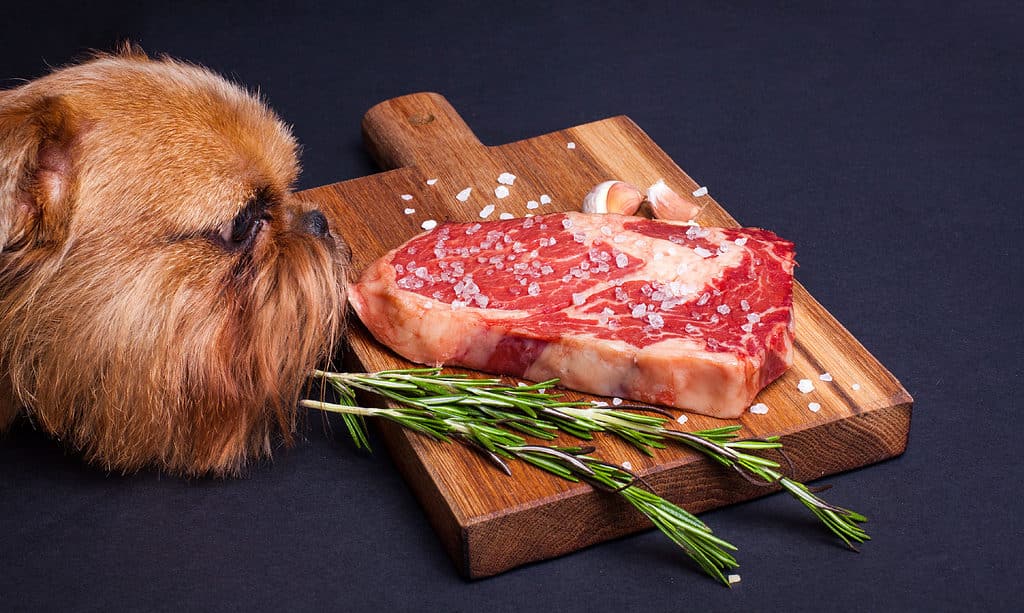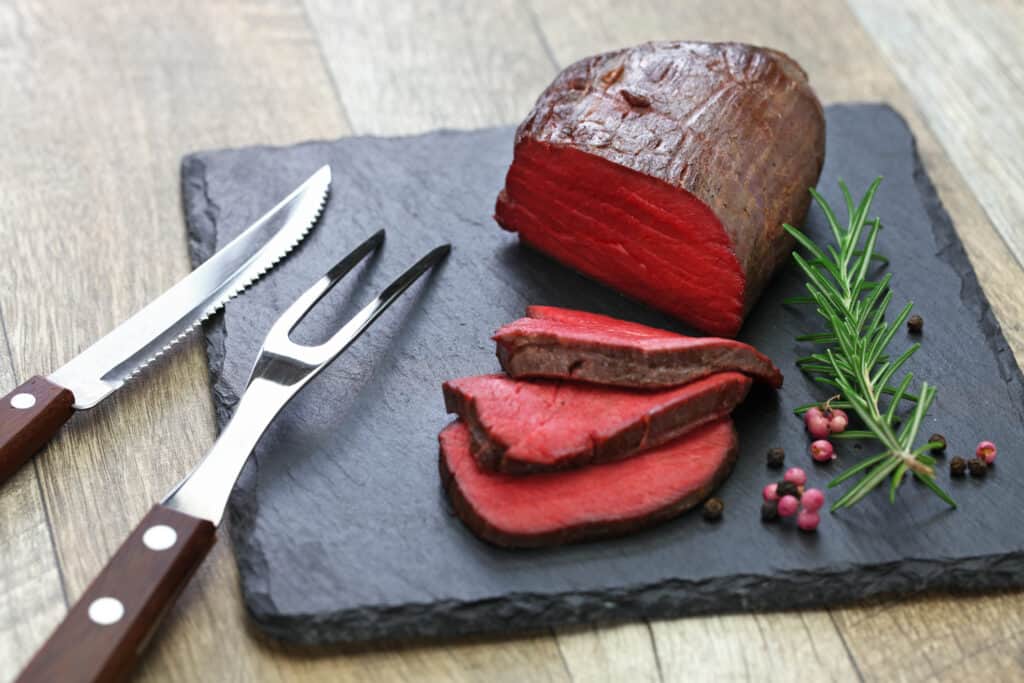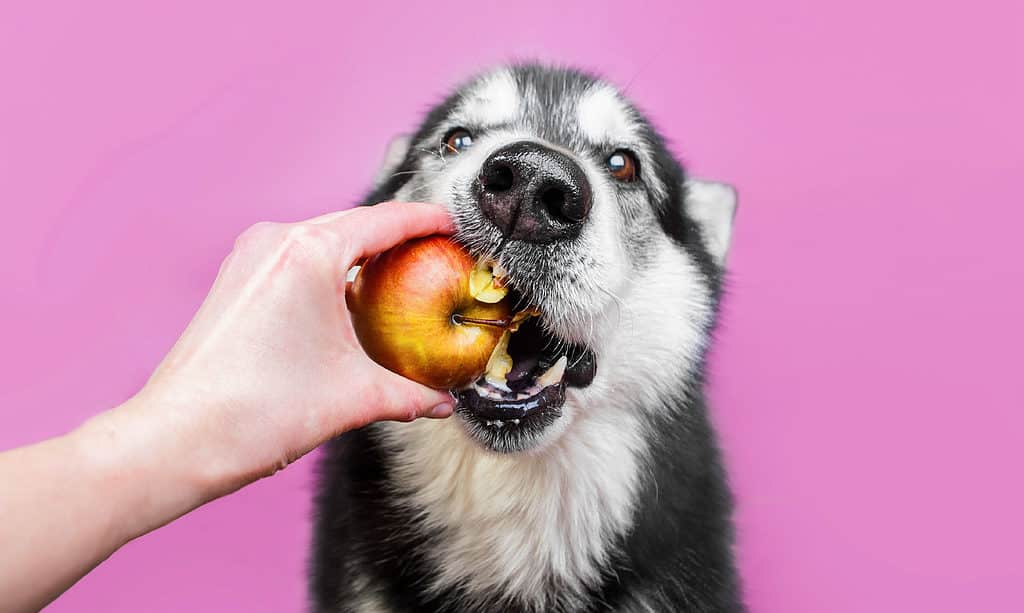In recent years, I’ve started to cut meat and animal products from my diet. Humans have been eating plant-based diets for a long time, and we’ve found that many (though not all) of us can survive and even thrive without meat.
This has led many people to wondering if it’s the same for our pets. You might know that cats are obligate carnivores, and absolutely need meat in their diet. But is it safe to raise a dog on a vegan diet?
So far, we don’t have enough data to confirm or deny whether a vegan or vegetarian diet is good for dogs. However, most veterinarians and veterinary associations agree that dogs should be fed a meat-based diet.
In addition, there are some known risks such as nutrient deficiencies being common in homemade diets, and legumes being possibly connected to an increased risk in heart disease.
That said, let’s dive into vegan diets for dogs to learn if they’re safe, what veterinarians say, and more.

So far, we don’t have enough data to confirm or deny whether a vegan or vegetarian diet is good for dogs.
©Ahanov Michael/Shutterstock.com
Are Dogs Carnivores?
Firstly, there is a misconception that dogs are carnivores like cats. Carnivores are animals whose natural diets consist of only meat.
Instead, dogs are omnivores, just like humans. This means that they eat a mixture of meat and plants.
Studies have shown that dogs have adapted to living with humans for thousands of years, and thus their diet is different from that of a wolf. They need more starch in their diet, for instance, likely because for most of history humans have fed their dogs table scraps.
That said, dogs also aren’t herbivores, which are animals that only or primarily eat plants. So, a vegan diet is controversial and potentially unhealthy.

Studies show dogs have adapted to living with humans for thousands of years, and thus their diet is different from that of a wolf.
©David Charles Cottam/Shutterstock.com
Can Dogs Survive Without Meat?
Dogs can survive without meat, but we don’t yet have enough studies to know if they thrive on this diet. Please remember that these are two different things!
For instance, your dog can also survive years locked in a crate without exercise–but they wouldn’t be happy, healthy, or well cared for.
Whether a vegan diet is actually detrimental hasn’t been thoroughly studied. Though there is one large study that claims vegan dogs are healthier than those who eat meat, it’s incredibly flawed and likely not true.

Dogs can survive without meat, but we don’t yet have enough studies to know if they thrive on this diet.
©iStock.com/vasiliybudarin
The Dangers of Homemade Diets for Dogs
Most veterinarians recommend against homemade diets because they often cause nutritional deficiencies. It’s vital that your dog is fed a food formulated by a board-certified veterinary nutritionist.
Likely, a dog eating a vegan diet would need supplements rather than getting all of their nutrients from whole foods. While this isn’t necessarily bad, and commercial dog foods often contain supplements, whole foods are a better source of nutrients when possible.
The History of Dog Food Trends
Another thing to keep in mind is that, as consumers become more aware of what their dogs are eating, companies are getting better at marketing foods as healthy. They create trends that are sometimes detrimental to our dogs.
An example of this is grain-free dog food, which has been linked to heart disease. Boutique dog food brands have also been shown to cause health problems. While they aren’t all bad, many use ingredients our dogs aren’t used to eating and aren’t properly formulated by a veterinary nutritionist.
The reason I mention this is because when there isn’t yet science behind a type of food, such as grain-free or vegan, it inherently comes with risks. The same goes for dog foods with ingredients that are unusual, as they’re less likely to have been thoroughly studied.
Personally, the lack of science is why I wouldn’t feed my own dogs a vegan diet. It sounds like a good idea in theory, but I wouldn’t want to find out years down the line that it actually hurt them!
Why Would You Feed a Dog a Vegan Diet?

There are various reasons people might want to feed their dog vegan.
©Chendongshan/Shutterstock.com
There are various reasons people might want to feed their dog vegan. These may include ethics like not wanting to support the meat industry, or wanting to do better for the planet. Some people want to feed their dogs vegan because their dog has food allergies.
Some dogs have allergies to various meats, and people may find that a vegetarian or vegan diet is best for these dogs in particular. This is very uncommon and should only be done under the guidance of a veterinarian.
Other people may have heard that plant-based diets are the best for their dogs, and want them to be as healthy as possible. However, we don’t have enough research to confirm or deny that at this time.
For me, the risks outweigh the positives. Although I’d love to support the meat industry as little as possible, my pets’ health has to come first, and we don’t yet know how risky a vegan diet might be.
Do Dogs Prefer Meat?
While dogs are omnivores, they naturally eat a lot of meat. Our current science says that meat should be the number one ingredient in any dog food.
Apart from health, most dogs are going to prefer meat over plant-based foods like vegetables or fruits. There is an argument to be made that it’s not fair to change an animal’s diet because of human morality–especially when it takes away from their natural instincts and may harm them.

Our current science says that meat should be the number one ingredient in any
dog food
.
©iStock.com/bonchan
Are Vegan Diets Healthier for Dogs?
Unfortunately, there is a study going around that claims to have found that vegan dogs are healthier than dogs who eat meat.
This study claimed that dogs fed a meat-based diet required more medications, went to the veterinarian more often, and had more health problems.
The problem is that this information comes from surveys–the dogs weren’t tested by a veterinarian to confirm their health before, during, or after the study.
When relying on survey answers from dog owners, we could be getting very unreliable data. For instance, it could be possible that those who feed their dog vegan diets are more prone to seeking natural remedies. Thus, their dogs might not have been given medications even if it was needed.
Another flaw in the study is that the vegan-fed dogs were a year younger on average. Thus, less likely to experience health problems than the older dogs who were fed meat.
Lastly, this wasn’t a lifelong study. It doesn’t tell us how long vegan-fed dogs live compared to those on traditional meat-based diets. Nor does it tell the long term consequences of a vegan diet.
Based on the current science, most veterinarians and the American Veterinary Medical Association (AVMA) agree that vegan diets for dogs aren’t recommended. While guidelines may change as more studies are done, this is unlikely.

Based on current science, most veterinarians and the American Veterinary Medical Association (AVMA) agree vegan diets for dogs aren’t recommended.
©Ellina Balioz/Shutterstock.com
Risks of a Vegan Diet for Dogs
There are several risks of a vegan diet for dogs, including:
- They may develop protein deficiencies, since most dogs’ primary source of protein is meat. It’s more difficult to get protein from plants, and dogs need a lot more of it than humans! A deficiency is especially likely in diets that aren’t carefully formulated by a veterinary nutritionist.
- The diet might not contain the right amount of amino acids like taurine or L-canatine. It might also be lacking in other vitamins and minerals, causing a nutrient deficiency.
- The FDA is currently studying a possible link between heart disease in dogs and legumes. It’s possible that vegan diets containing legumes may increase your dog’s risk of heart disease.
- Vegan diets are mostly unstudied, so there may be other risks yet to be found.

They may develop protein deficiencies, since most dogs’ primary source of protein is meat.
©Masarik/Shutterstock.com
Can Dogs Live Off of Meat Alone?
Now that we’ve discussed vegan diets, what about a fully carnivorous diet?
The answer is that no, dogs cannot survive from eating only meat. They need plant-based nutrients in their food from fruits and vegetables.
For dogs, it’s likely that neither extreme is good. A balanced, veterinarian-recommended diet will consist of both meat and plant-based foods.
The photo featured at the top of this post is © Glenkar/Shutterstock.com
Ready to discover the top 10 cutest dog breeds in the entire world?
How about the fastest dogs, the largest dogs and those that are -- quite frankly -- just the kindest dogs on the planet? Each day, AZ Animals sends out lists just like this to our thousands of email subscribers. And the best part? It's FREE. Join today by entering your email below.
Thank you for reading! Have some feedback for us? Contact the AZ Animals editorial team.







